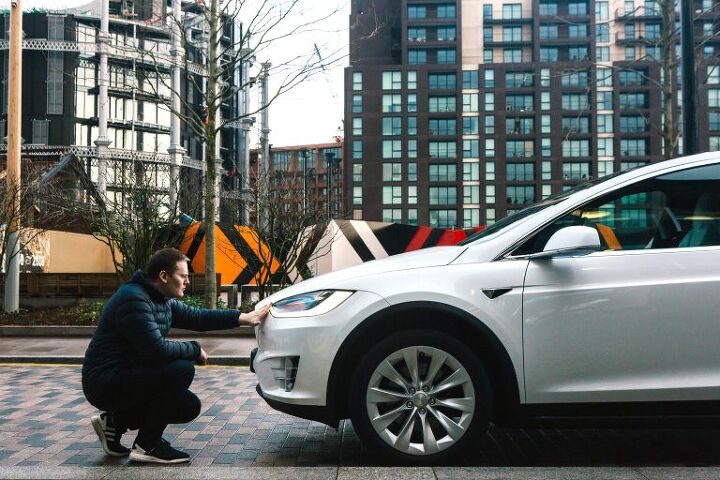Tesla Owners Maintain a Deep Affection for Their Cars, Despite Quality Issues

Despite garnering below-average reliability ratings, Tesla is probably the one car brand with the most fervent disciples. While not all Tesla fans are blindly loyal, most are willing to cut the company much more slack than you would Ford the next time your Focus’ bum transmission acts up. Granted, Tesla’s automobiles do possess elements that most Fords do not — namely prestige and a highly unique driving experience.
An elegantly fashionable car will, of course, be more easily forgiven for its missteps than some plain-Jane model. However, the Model S and X have suffered more than just the occasional mechanical error. The Model X is infamous for its malfunctioning electronic doors and wonky electronic interface, while the Model S has suffered from quality control issues since day one. Still, every time an owner voices a concern about reliability or the company’s lackluster ability to service its vehicles, their complaint usually comes with an addendum specifying that they still adore their purchase.
The Motley Fool published an article this month where the author called the repair of his damaged Model S “an utter nightmare” before admitting to missing the car because he loved it so much. Last year, Consumer Reports discovered that 91 percent of Tesla owners agreed that they would “definitely” purchase their specific vehicle again if forced to make the decision a second time — placing the EV company at the top of the publication’s customer satisfaction survey by a wide margin.
With that in mind, J.D. Power and Associates will soon release a report called “Tesla: Beyond the Hype.” According to the marketing and information services company, the piece offers a detailed examination of the brand’s quality issues, insight from focus groups of Tesla owners, and an evaluation of the electric manufacturer’s vehicles against its closest competition.
However, you don’t need a study to understand that most Tesla loyalists like being part of a special club, tend to be tech obsessed, are owners of a second vehicle, and make enough money to afford the setbacks associated with a sometimes persnickety car. These people have a genuine tenderness for their EV because its fits into their lifestyle and they identify with what the brand represents to them.
“Tesla owners see themselves as pioneers who enjoy being early adopters of new technology,” said Kathleen Rizk, director of global automotive consulting at J.D. Power. “Spending $100,000 or more on a vehicle that has so many problems usually would have a dramatically negative effect on sales and brand perception. Right now, though, Tesla seems immune from such disenchanted customers.”
Much of that is likely to change once the Model 3 goes on sale to less-enthusiastic shoppers, though.
“When consumers buy a mass-market car priced around $35,000 that will be their primary mode of transportation, the degree of expectation will increase immensely,” Rizk said. “We’ve seen that with other well-liked brands, whether or not it involves an electric vehicle.”
[Image: Tesla Motors]

A staunch consumer advocate tracking industry trends and regulation. Before joining TTAC, Matt spent a decade working for marketing and research firms based in NYC. Clients included several of the world’s largest automakers, global tire brands, and aftermarket part suppliers. Dissatisfied with the corporate world and resentful of having to wear suits everyday, he pivoted to writing about cars. Since then, that man has become an ardent supporter of the right-to-repair movement, been interviewed on the auto industry by national radio broadcasts, driven more rental cars than anyone ever should, participated in amateur rallying events, and received the requisite minimum training as sanctioned by the SCCA. Handy with a wrench, Matt grew up surrounded by Detroit auto workers and managed to get a pizza delivery job before he was legally eligible. He later found himself driving box trucks through Manhattan, guaranteeing future sympathy for actual truckers. He continues to conduct research pertaining to the automotive sector as an independent contractor and has since moved back to his native Michigan, closer to where the cars are born. A contrarian, Matt claims to prefer understeer — stating that front and all-wheel drive vehicles cater best to his driving style.
More by Matt Posky
Latest Car Reviews
Read moreLatest Product Reviews
Read moreRecent Comments
- Shipwright As my Avatar shows I had an '08 GT 500, Grabber Orange convertible. I now own a '12 GT 500 Kona Blue coupe.
- ArialATOMV8 I tend to prefer more amusing colors when picking out a car (if possible). My 2017 Lexus RX is painted in a Nightfall Mica (Dark Blue) and I really dig the look. In the dealership it stands out compared to the regular tame blacks, silvers and whites. Soon I may be at the point to afford a new car and when I do, I'll do my part and spec/hunt for an allocation of a vibrant color.
- Tassos Tim is not that good with colors.The bright "pink" is not pink, but FUCHSIA. Both colors may look good on a woman's sweater, but not on steel panels.
- Tassos While I was a very satisfied owner of a much earlier Accord COupe 5 speed (a 1990 I owned from 1994 to 2016), I don't like the exterior styling of this one so much, in fact the 2017 sedan looks better. Or maybe it sucks in white. The interior of my 1990 was very high quality, this one looks so-so. The 157 k miles were probably easy highway miles. Still, Hondas are not Toyotas, and I remember the same service (like timing belt replacement) back then cost TWICE for an Accord than for a Camry. Add to this that it has the accursed CVT, and it's a no. Not that I am in the market for a cheap econobox anyway.
- 3-On-The-Tree My 2009 C6 corvette in black looks great when it’s all washed and waxed but after driving down my 1.3 mile long dirt road it’s a dust magnet. I like white because dust doesn’t how up easily. Both my current 2021 Tundra and previous 2014 Ford F-150 3.5L Ecobomb are white


































Comments
Join the conversation
Lets not forget the DLC/crippleware of certain models, how long until Tesla charges us $500 to unlock extra cup holders?
I want to like electric cars, in spite of their limitations. Unfortunately, the manufacturers (Tesla in particular), the owners, and the fanboys make it really, really difficult. Fanaticism, virtue-signalling, narcissism, self-importance, global-warming environmentalism (I'm just repeating myself), etc from the lock-stepping faithful tends to drive away the more rational, thoughtful prospective consumer. At this point, the only EV's that seem to make any sense are off-lease compliance cars. The faithful resent the cars and the manufacturers for making them, and their pricing fairly accurately represents their true (non-subsidized) value. It is possible to pick up a ~3 year old compliance EV with under 30k miles for under $10k / 30 cents on the MSRP dollar. If a person can live with the limited range, there is a good chance that these red-headed childern of the EV world could actually be economically viable.